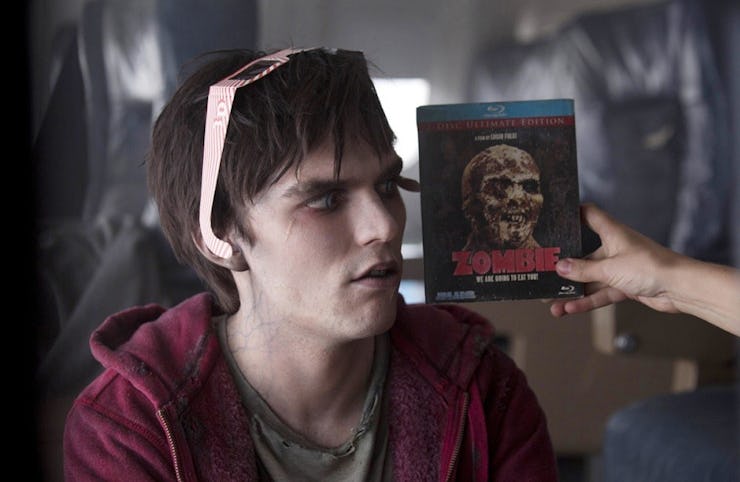If The Last of Us Made You Bawl Your Eyes Out, You Need to Revisit This Zombie Rom-Com
“There's a lot of ways to get to know a person. Eating her dead boyfriend's brains is one of the more unorthodox methods, but...”

Not a dry eye was seen on Sunday night, when audiences witnessed a gripping, gut-punching queer love story in an unlikely place: HBO’s new prestige zombie drama, The Last of Us.
While spotlighting a gay couple for almost 80 minutes with nary a cordyceps fungus-ridden ghoul in sight was groundbreaking for the horror subgenre, inserting fairytale courtship and passionate kisses into undead content isn’t new. 10 years ago, zombie plagues were given an endearing uplift with Warm Bodies.
Based on Isaac Marion’s 2010 novel, itself inspired by Romeo and Juliet, Warm Bodies is able to keep the romance alive among its living dead as R (Nicholas Hoult) falls so hard for Julie (Teresa Palmer) that his heart actually starts beating again. Though the premise is a smidge corny, it still gives horror lovers some pulse-quickening spooks and paranormal comedy enthusiasts plenty to cackle about. Its genre-bending risk during the peak of The Walking Dead’s grip on American primetime entertainment paid off: not only was it received well by both critics and audiences (a rarity in the 2010s for most horror and rom-com flicks), it went on to incentivize more playfulness within the subgenre.
From the moment a baby-blue-hued and wide-mouthed Hoult begins a deadpan monologue about how pale he is, how he should eat better, how his posture is terrible, and how he should stand up straighter to better connect with people, it’s clear that Warm Bodies is a departure from normal zombie fare.
Its world is typical enough; it’s been ravaged by a zombie plague, producing capital-C Corpses, zombies who still mostly look human and feed on the brains of the living, allowing them to live vicariously through their victims’ memories. After prolonged exposure to the virus, Corpses devolve into Boneys, a feral, skeletal creature with thick black veins enveloping its threatening body.
Though R, a Corpse, can only communicate verbally with little more than grunts and moans, Warm Bodies is told from the distinctive POV of a rather charming zombie. Instead of keeping the protagonist detached from the audience or his own underlying humanity, director and writer Jonathan Levine keeps R’s narrations humorous and insightful, and his actions throughout the film tender and heroic. Viewers are immediately drawn to R’s monstrous physical state and his innermost thoughts: the zombie is, finally, the one being rooted for.
Sure, he eats Julie’s boyfriend’s brains when she has her back turned to him, but Perry’s memories of Julie only enhance R’s feelings for her. He rescues her from a hoard of Corpses, and whisks her away to safety. As R and Julie begin to form a powerful bond, love begins to mitigate, and eventually dissipate, the virus from R’s bloodstream. He’s slowly but surely able to communicate more, and even remember a thing or two about his pre-infection past.
Lio Tipton as Nora, Teresa Palmer as Julie, and Nicholas Hoult as R.
Warm Bodies wasn’t exactly the be-all and end-all of zombie innovation. Since 2013, we’ve seen a TV show centered on a cute and clever zombified medical examiner (iZombie), a zombie spin on a Jane Austen classic (Pride and Prejudice and Zombies), a nail-biting zombie psychological horror (The Wailing), family-friendly singing zombies overtake the Disney Channel (Z-O-M-B-I-E-S), a zombie plague period drama set in the 16th century (Kingdom), a zombie movie paired with a heist (Army of the Dead), and even the Marvel Cinematic Universe embrace zombies, both of the animated (What If...?) and reanimated variety (Doctor Strange 2). That’s a whole lot of stories, and even that little rundown only scratches the surface of several creative spins on the walking dead.
Still, zombies romancing humans or their fellow undead have been far and few between. That’s what continues to make Warm Bodies so special. An adorable and somehow still attractive zombie is able to get the girl of his dreams, and the movie doesn’t end with a miserable, despairing twist. Instead, R and Julie manage to spread word of the virus’ weakness, overthrow Julie’s corrupt and trigger-happy father (John Malkovich), and live to see the dawn of a better age for Earth. Levine opted to keep Romeo and Juliet’s tragic elements at bay, and Warm Bodies benefitted greatly from a revitalized, optimistic take on the play.
Almost 10 years to the day after Warm Bodies’ theatrical release, The Last of Us’ Bill and Frank moved audiences with their mushy-gushy bottle episode, teetering on The Notebook levels of heart-wrenching sappiness while the world imploded around them. Like Warm Bodies, it delivered a message of hope amid the bleakest of circumstances. We may never get a Romeo and Juliet meets undead apocalypse rom-zom-com again, but genre-bending zombie stories that offer flashes of the best of humanity in between the jumpscares will remain en vogue.
This article was originally published on